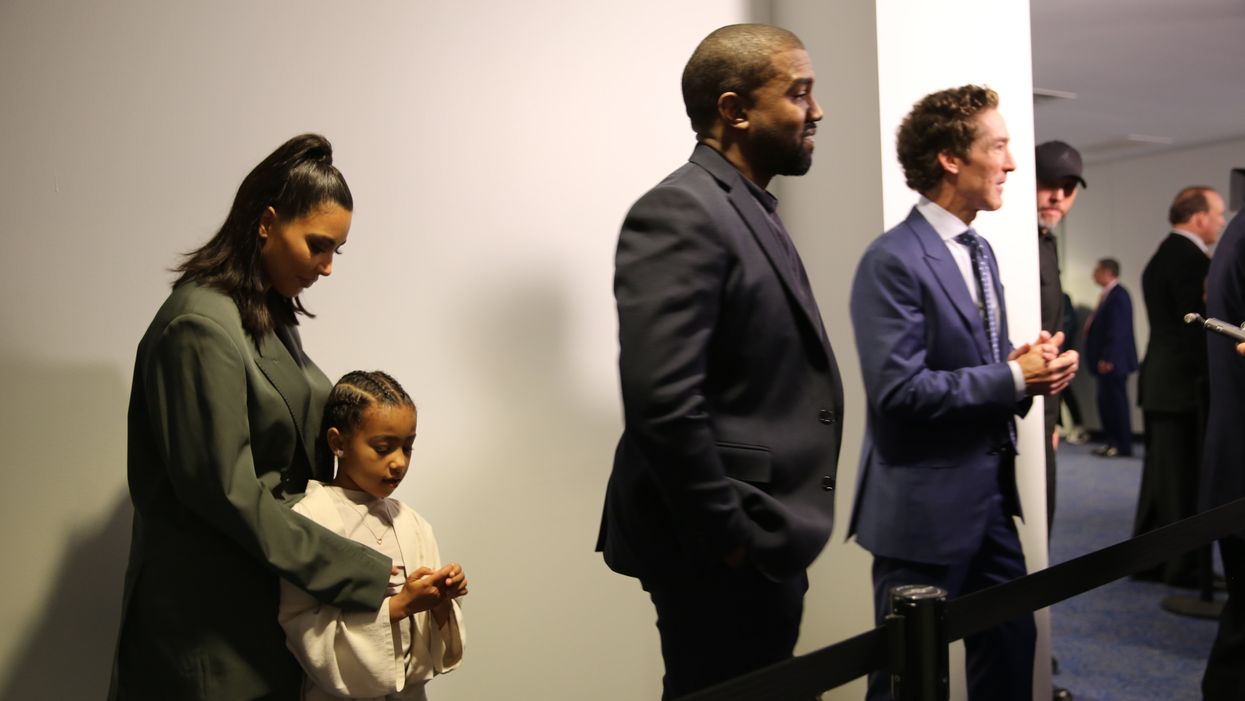
Photo by Caroline Ryan

His ever-changing devotion to art.
Apollo, god of poetry, light, prophecy, dance. Star of Greek mythology, rivaled only by Zeus, his father. God of justice. God of purification, knowledge, healing. God of the Sun. But most of all, god of music. So they called him the Leader of the Muses.
And on a bright Sunday morning midway through November, at the tail end of a decade, rapper-producer Kanye West looked out at the congregation of Joel Osteen's Lakewood Church, a 16,000-seater originally built for the Houston Rockets, and said, "Jesus has won the victory: Now the greatest artist God ever created is now working for him."
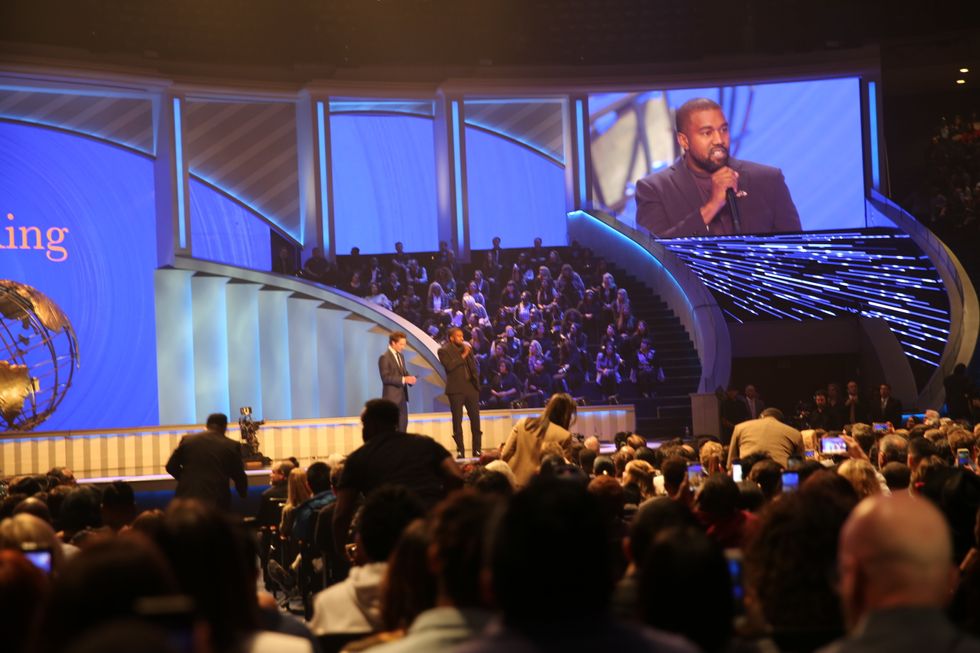
Kanye's newest album, "Jesus Is King," had been out for three weeks, and like every Kanye album, it was controversial, as adored as it was unaccepted.
Critics had shown a mostly tepid response, but nobody could tell if their disinterest was genuine, or if it was politically motivated.
After all, for the past year, Kanye had once again managed to penetrate the epicenter of American society. The last two presidents had literally shamed and cursed Kanye, but, still, who could've guessed he would befriend this one?
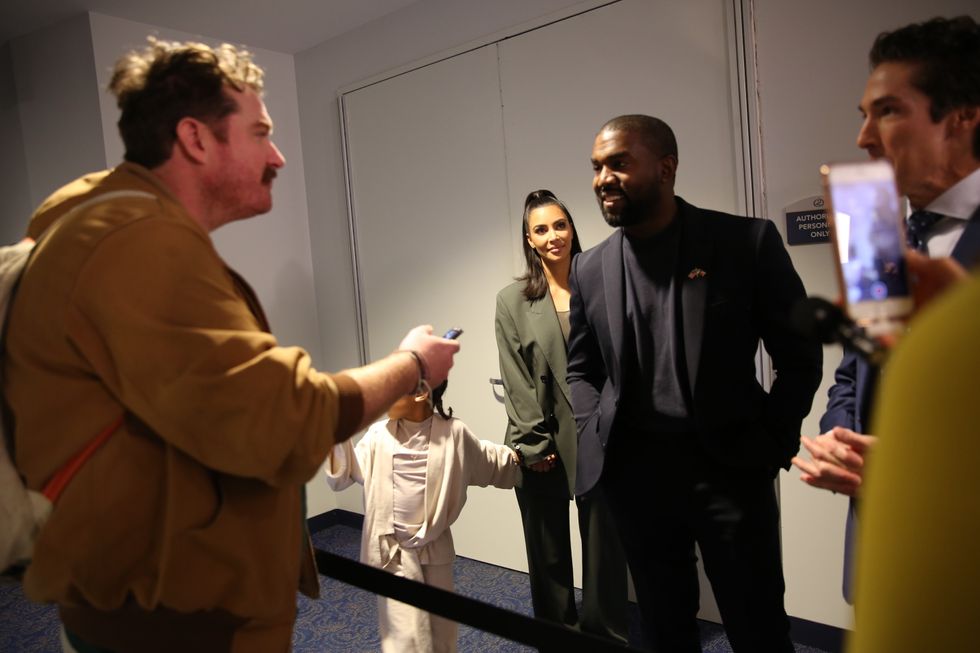
The week after Kanye's appearance at Osteen's church, at the House impeachment hearings, as the entire country watched and listened, congressmen and diplomats would mention longtime Kanye collaborator A$AP Rocky no fewer than five times, in casual reference to the Kardashians and the deal between Trump and Sweden, struck at the urging of Kanye West.
Meanwhile, "Jesus is King" became the ninth consecutive Kanye album to debut at No. 1 on the Billboard 200 — a feat he shares with Eminem and The Beatles — and the sixth time in the 2010s alone. And, to be fair, his only studio album not to debut at No. 1 was "The College Dropout," his first, which went triple platinum and earned the third-most Grammy nominations in one night, winning Best Rap Album and Best Rap Song with "Jesus Walks."
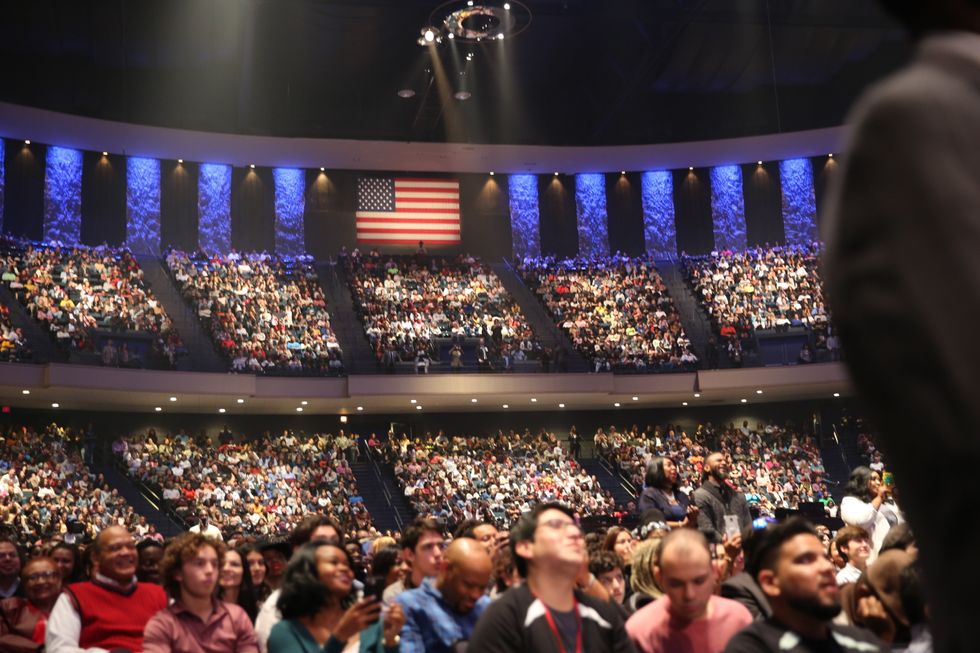
"Jesus is King" was also the first record ever to top R&B/Hip-Hop Albums, Rap Albums, Christian Albums, and Gospel Albums simultaneously. All 11 tracks charted on the U.S. Billboard 100, joining the other 96 Kanye songs to have landed on the Top 100.
This album was different, and not just because of Kenny G. For the first time, Kanye was not a god or a self-destructive fallen angel. He was a father, a husband, a son, and, most important, a man full of belief, with his hands outstretched, surrounded by a choir.
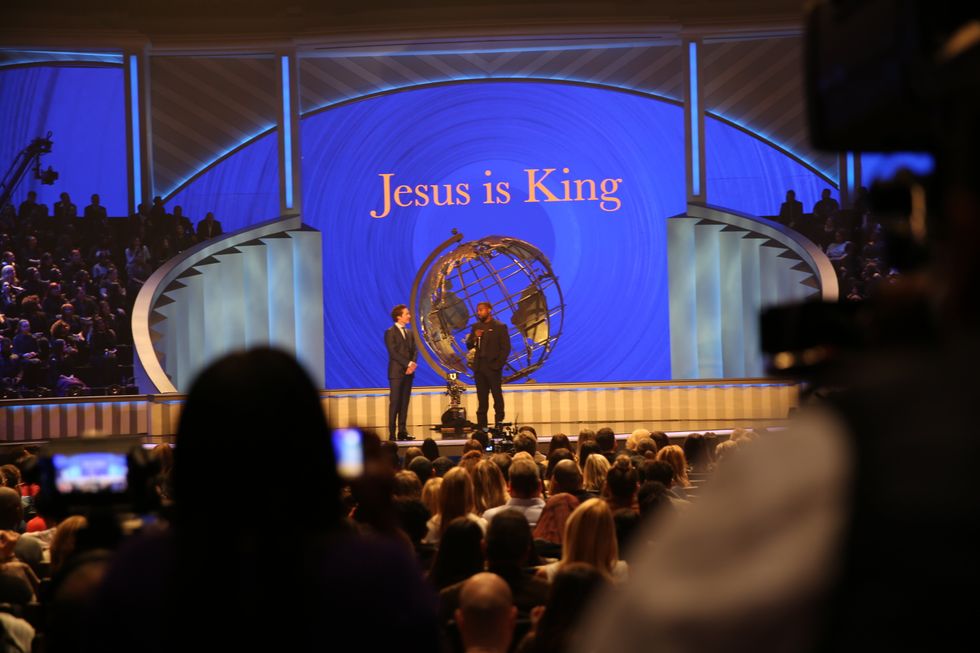
"I remember sitting in the hospital at UCLA after having a breakdown," he told the congregation, "and there's documentations of me drawing a church and writing about starting a church in the middle of Calabasas."
That night, following an afternoon of ice skating at the Galleria, Kanye returned to Lakewood Church and performed a concert. Imagine hearing an electro-gospel opera in an arena designed, acoustically, for professional basketball games. Only better, because everything had been padded. With LSD graphics on the swirly blue carpet.
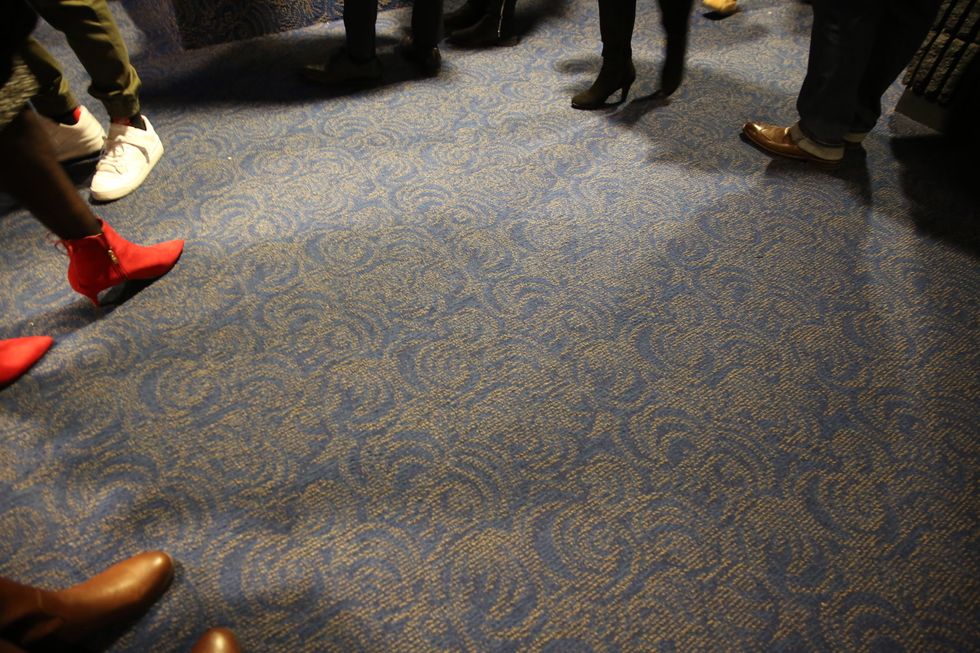
When we experience art, it changes us.
So there I was, four rows from the stage, crying in front of Fox News. Because Kanye had brought his Sunday Service choir with him, and they were singing "Ultralight Beam," one of the few perfect songs ever made, a song that played during my wedding ceremony, the song my daughter, God willing, will be born to, a song I have never once listened to without at least tearing up.
“Jesus Is King" A Sunday Service Experience at Lakewood Church with Kanye Westyoutu.be
This is a God dream, this is a God dream. This is everything.
Kanye was the only person onstage dressed in his own clothing, a neatened blazer. The choir were draped in gray, like holy silhouettes.
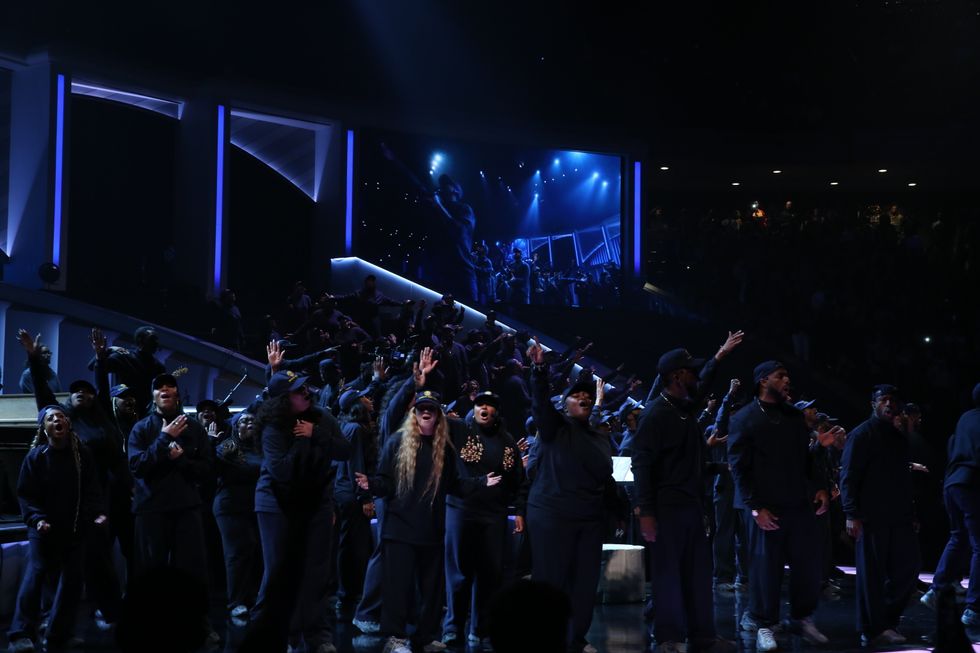
We had drifted into the immediacy of it all. And I wasn't about to play stoic journalist here. I wasn't a reporter first and a human or an American later.
The choir zigzagged on the loft flanking the stage. Each of them had a headset microphone, like country singer Garth Brooks.
God only knew how they sang so perfectly. How did they project their voices like that? More beautiful than anything we had ever heard, more beautiful than water.
After "Ultralight Beam," it was "Every Hour," the mesmeric opening track of "Jesus Is King."
Sing every hour, Every minute, Every second, Sing each and every millisecond, We need you
Every Houryoutu.be
The performance felt all the more sacred because this was church, where people gathered to lose themselves, to sing as a chorus, to confront who they really are.
Across the street, one protester stood hollering.
Meanwhile, thousands of people waited at the entrance, giddy to get in. They would join us in no time. Soon, they would fill every seat in this church.
*
To be clear, Kanye West is a man of nowness. And, now, music is probably not even in the top 5 for Kanye. He's advanced to so many other things. He's emerged as a major player in the fashion world.
The man holds some of the most coveted real estate in Los Angeles — 318 acres in Calabasas, I don't use exclamation marks that often, but Kanye West owns 318 acres of land in Calabasas!!!!! And a ranch on 6,000-plus acres in Wyoming. Scratch that — two ranches in Wyoming, 50 miles apart.
But, I think he can never escape his own inexplicable devotion to art, whatever form that takes.
*
That morning, Kanye told Osteen, "It's like the devil stole all the good producers, all the good musicians, all the good artists, all the good designers, all the good business people and said, 'You gotta come over and work for me.' And now the trend, the shift, is going to change."
"Jesus Is King" was the result of a new cultural and artistic movement that more or less started with 2016's "Life of Pablo," Kanye's closeted gospel album. Which was a surprising departure from 2013's "Yeezus," with its tangled social commentary and fashionable solipsism. And that drum sound, the one every half-decent producer has spent the last six years failing to emulate.
The 2010's saw him grow more cerebral. He even teased a book of philosophy titled, "Break the Simulation."
Then, in 2018, he released "Ye," the second of five albums in a Kanye-produced series, all recorded at his Wyoming studio. In keeping with the criticisms of hip-hop he voiced on "Ye vs. The People"
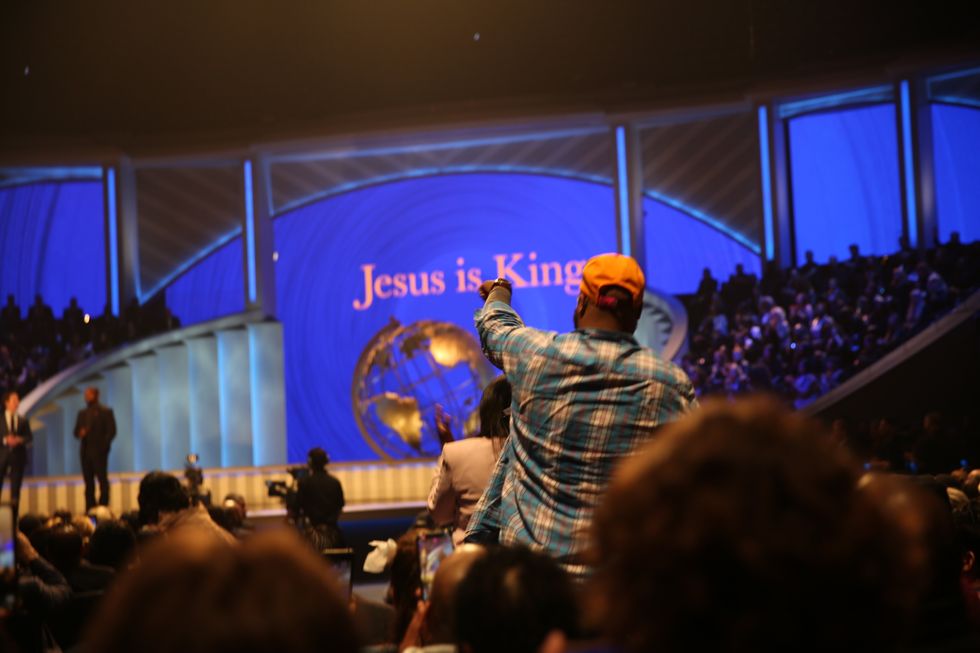
Kanye eschewed many of the themes he'd embraced for so long, replacing them with meditations on mental illness, fatherhood, suicide, love, and addiction. The album's working title had been "LOVE EVERYONE."
On "I Thought About Killing You," he raps:
The most beautiful thoughts are always beside the darkest.
The title "Ye" is not just the diminutive of "Kanye."
As he said in an interview:
I believe 'ye' is the most commonly used word in the Bible, and, in the Bible, it means 'you,' so it's [saying] "I'm you, I'm us, it's us." It went from being Kanye, which means the only one, to just ye – just being a reflection of our good, our bad, our confused, everything, that I'm just more of a reflection of who we are, just as beings.
Philosopher Hans-Georg Gadamer wrote:
All individuality is a manifestation of universal life, and hence everyone carries a tiny bit of everyone else with him, so that divination is simulated by comparison with oneself.
In the months following the release of "Ye," Kanye would live out this idea, and build his own movement, a reflection of who we are, then begin his church in Calabasas.
*
At 10:30 that morning, the three of us — Samantha Sullivan, my wife Caroline, and me — strolled into the arena and claimed seats in the media section.
That place resembled the inside of an ant colony. We were three ants.
The service began with errorless music, then shifted into a quick, stirring message by Osteen, who always seemed to appear onstage from nowhere, privvy to the kind of big-money stage tricks you find at a Shania Twain concert.
The entire place and all the Jumbotrons and all the people, it all had a cinematic presence.
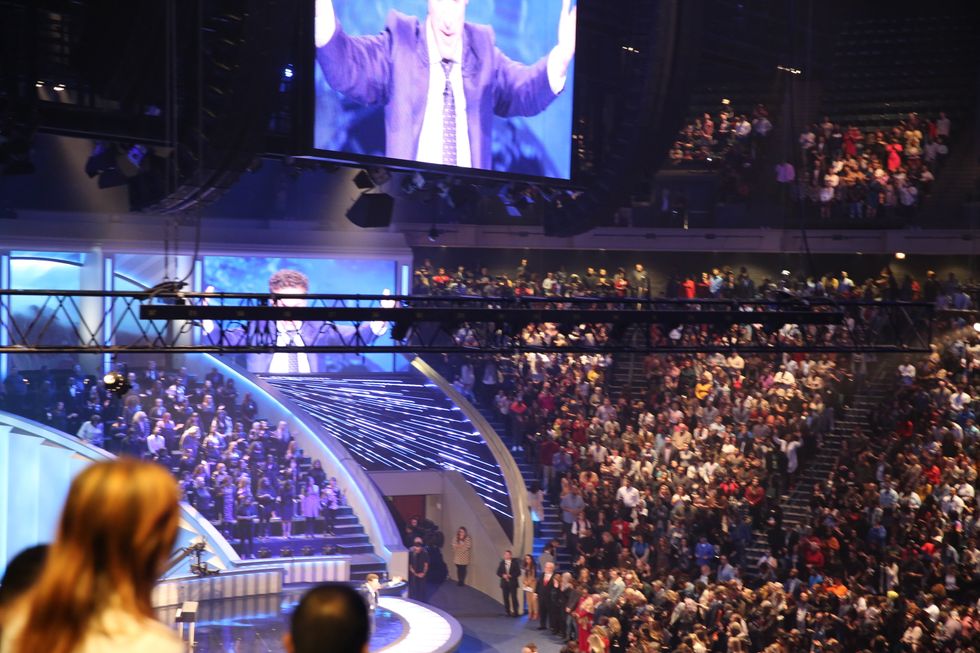
A preliminary giddiness spread through the room. Then, Kanye emerged, there on the stage, and the place erupted.
A man in a "Jesus Is King" shirt danced around his seat.
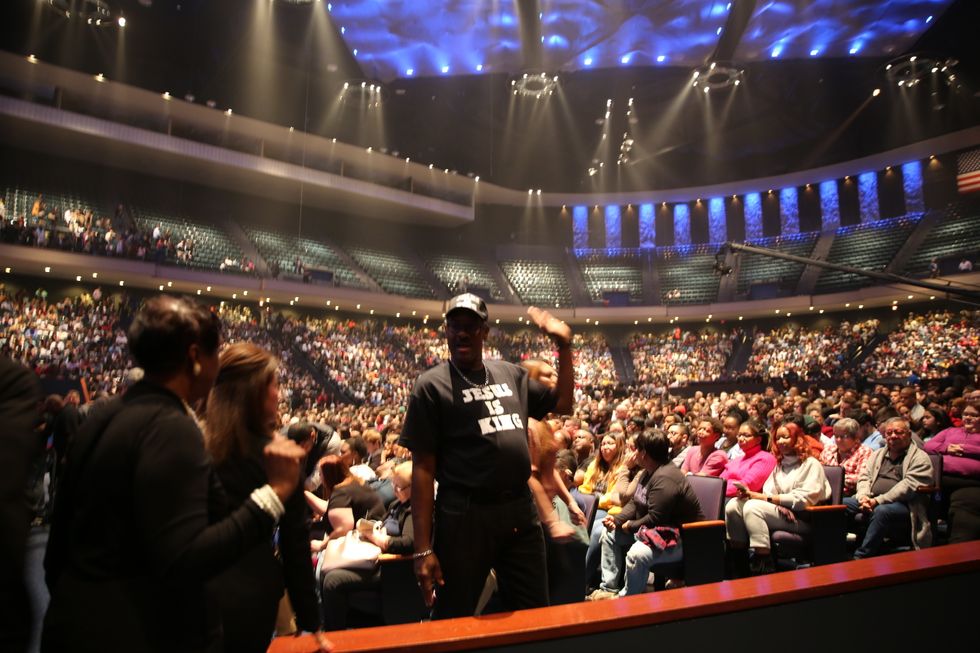
Everyone took their seats, but one man standing in the crowd shouted affirmations.
"Speak truth my brother," he shouted.
The man shouted several more times, then Kanye politely told the guy to hold off on the support because it wasn't helping, because Kanye needed relative quiet to capture and release his flow.
The ceiling glowed in skittish purple.
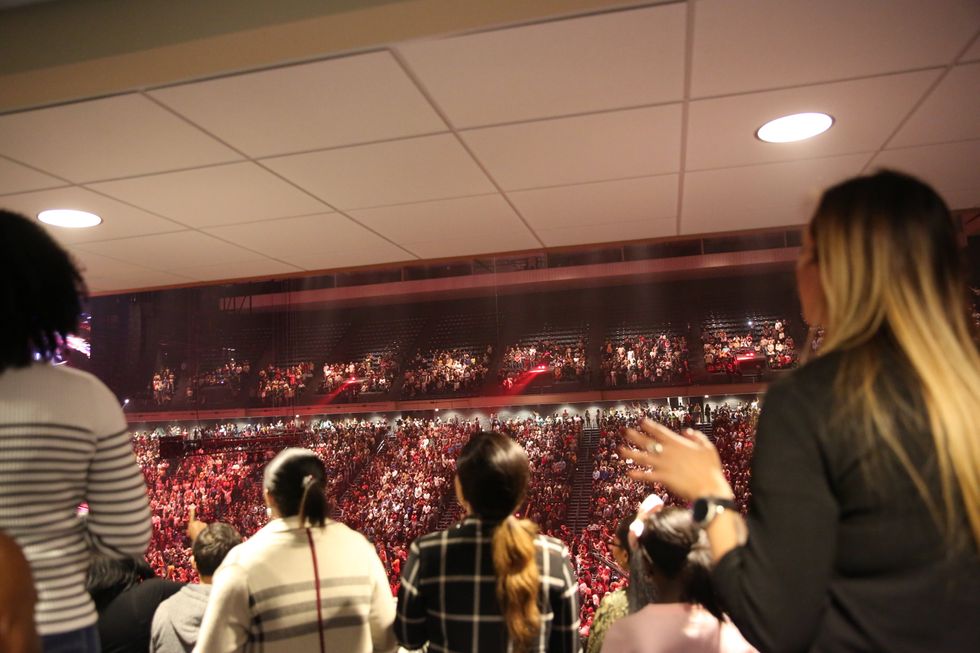
Kanye described the corrupting force of the media. A chill came over the room. Behind him, the unapologetic blue of "Jesus Is King."
It was my first encounter with Pastor Joel Osteen, and I was surprised and somewhat baffled to find him likable, based on everything I'd ever heard about the man.
Kanye said as much, that Osteen is nothing like the version of Osteen many people have broadcast.
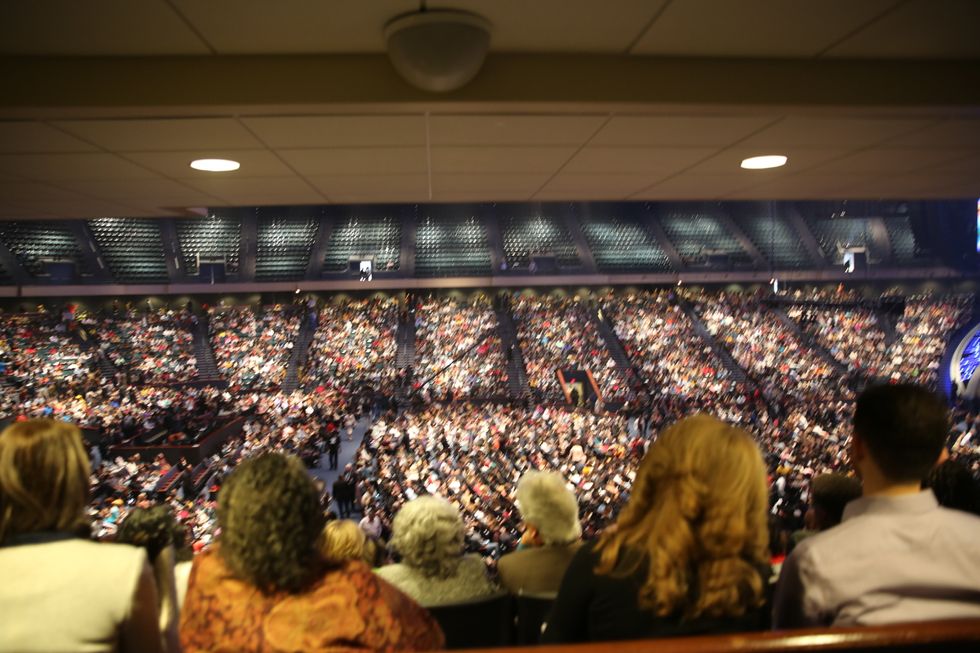
Osteen laughed, "When you've got Kanye defending you, you've made it, man."
Rays of light danced through the arena. I'm talking Pink Floyd light show levels.
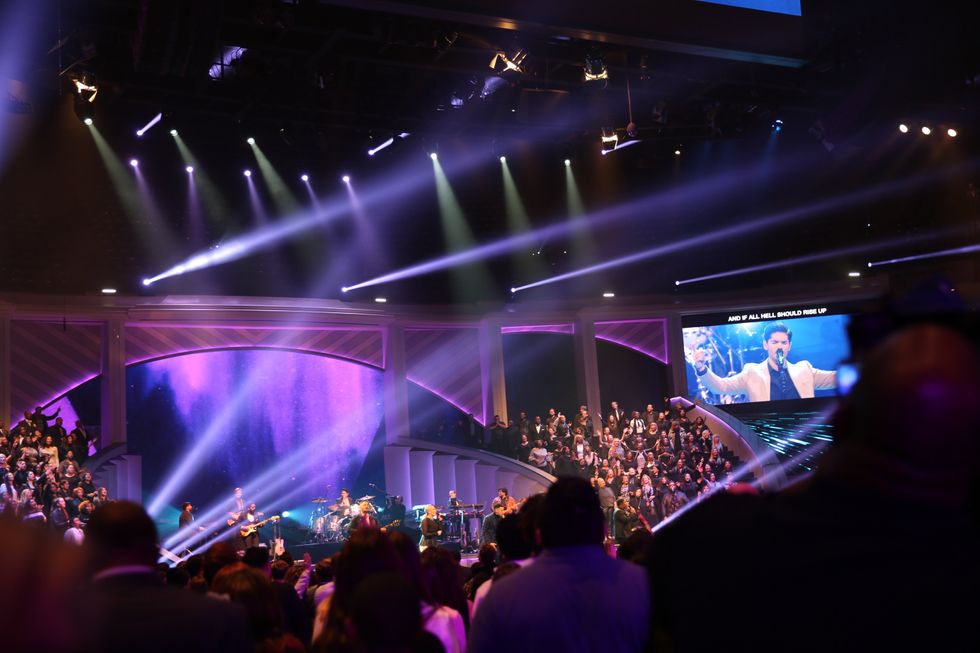
With 21 Grammys, Kanye is tied with Jay-Z as the most decorated hip-hop artist of all time.
Osteen asked Kanye what he would say to his younger self, if he could go back in time.
"You know, it's nothing I can say to the younger Kanye through words," he said. "I could speak to the younger Kanye through music."
*
Osteen played the middle section of "God Is," arguably the focal point of the album.
And Kanye danced and rapped along with it. And the sureality of the situation was daunting. Was that really Kanye West up there? With Joel Osteen? Dancing to his gospel song?
Six or seven years ago, I saw Kanye a mile away at the Toyota Center — coincidentally, the current home of the Houston Rockets — for his and Jay-Z's "Watch the Throne" tour. It was a much different experience than this.
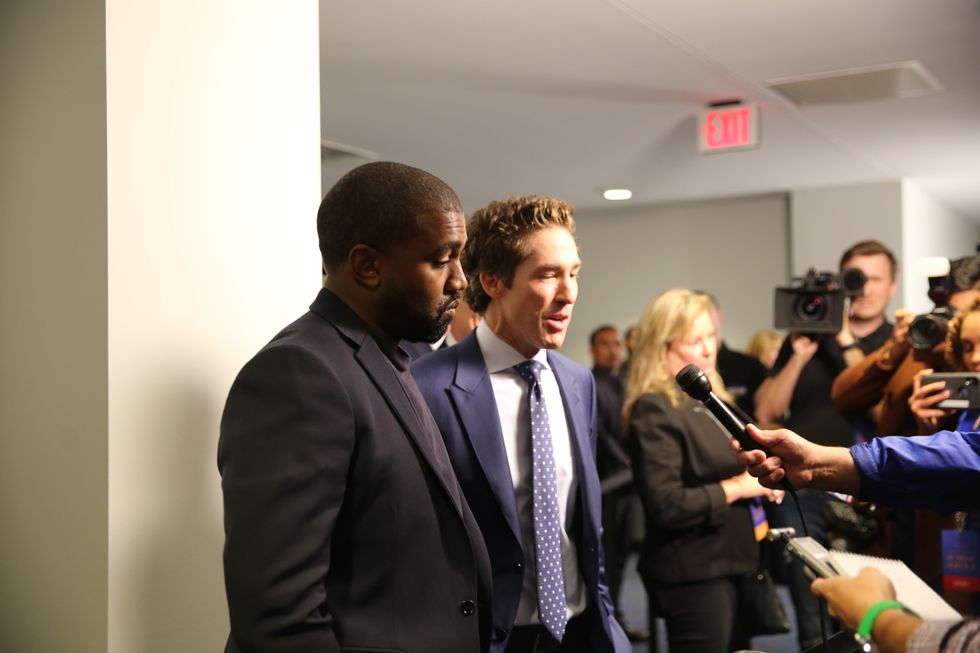
When Kanye finished, the media flooded out. As did a quarter of the people in the congregation. This bothered many of the regulars.
Security and ushers yanked big gray mop buckets from cabinets, and dispersed them down aisles, and money music played.
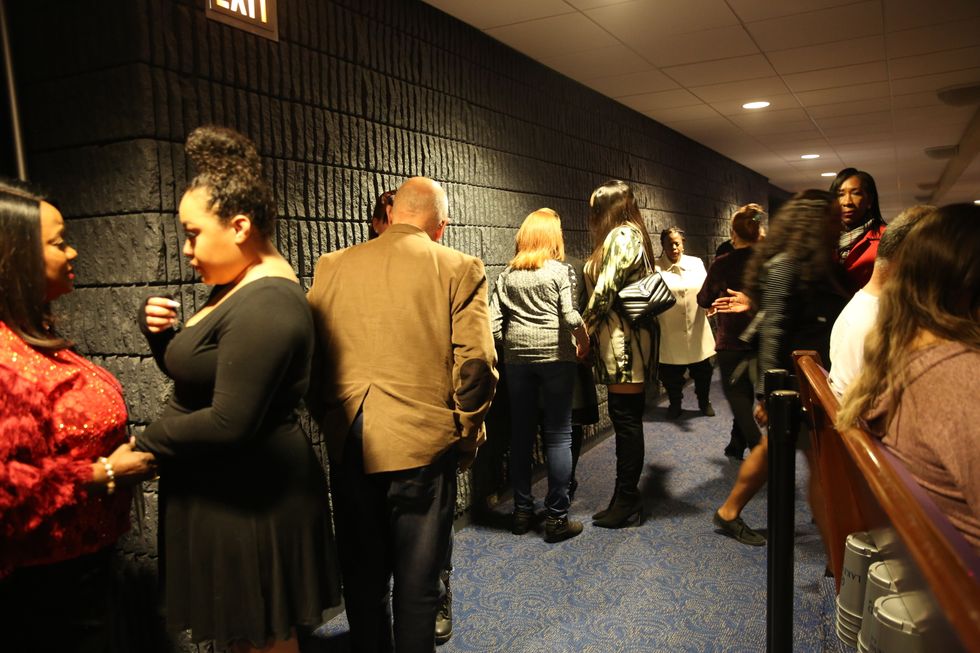
Then the time for prayer. Prayer leaders lined the walls and pews. And anyone could walk over to them and pray. Men and women clung to strangers, crying sometimes, hugging. Holding hands, whispering phrases.
*
One of the media coordinators pulled us out of the sermon, led us through passageways and elevators, past classrooms and security guards, through a black sheet, then behind a barricade.
This is where all the media had rushed off to like old folks trying to get the best seat for bingo.
Each news outlet was allowed one question.
After 15 minutes, the energy changed and you could tell they were near.
Then, Kim Kardashian West was walking our way, holding her daughter's hand, followed by Kanye, who was followed by Osteen.
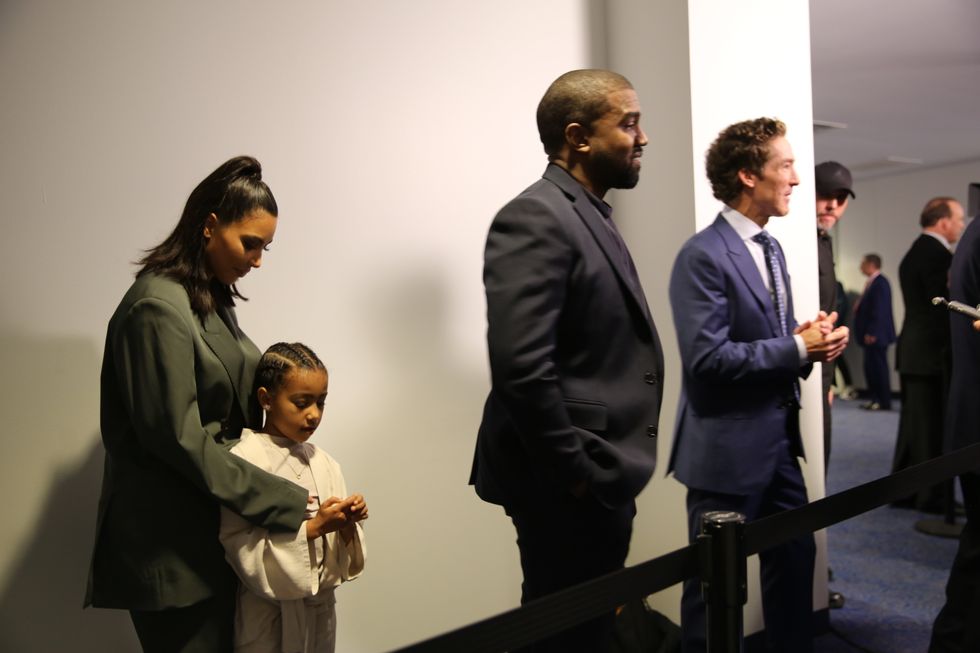
"Nice tags," Kanye said, referring to my "GOOD" necklace.
Then:
Brief interview with Kanye West and Joel Osteen at Lakewood Church, Nov. 17 in Houston, TXwww.youtube.com
Some of the outlets asked more than one question, but that was on them. They were the ones sinning in church.
*
In November 2007, Kanye's mother died during a routine surgery. He and his mom, Dr. Donda West, had always been incredibly close. She raised him alone, after Kanye's father left when Kanye was 3.
A few months later, his engagement with Alexis Phifer abruptly ended.
He was 30 at the time.
Oddly, this tragic sequence of events would cause the birth of auto-tune in rap. Broken-hearted, Kanye wanted to sing. So he ran his voice through a vocoder.
Kanye's album "808s & Heartbreak," which like "Jesus Is King" has no curse words, shoved music ahead at least two decades, into a world of synth-driven robotic R&B/Rap love songs belted out in janky auto-tune. That description doesn't sound ridiculous today. But that's only because Kanye eschewed the stale hip-hop of the early 2000s and reinvented the genre, something he has accomplished with every album.
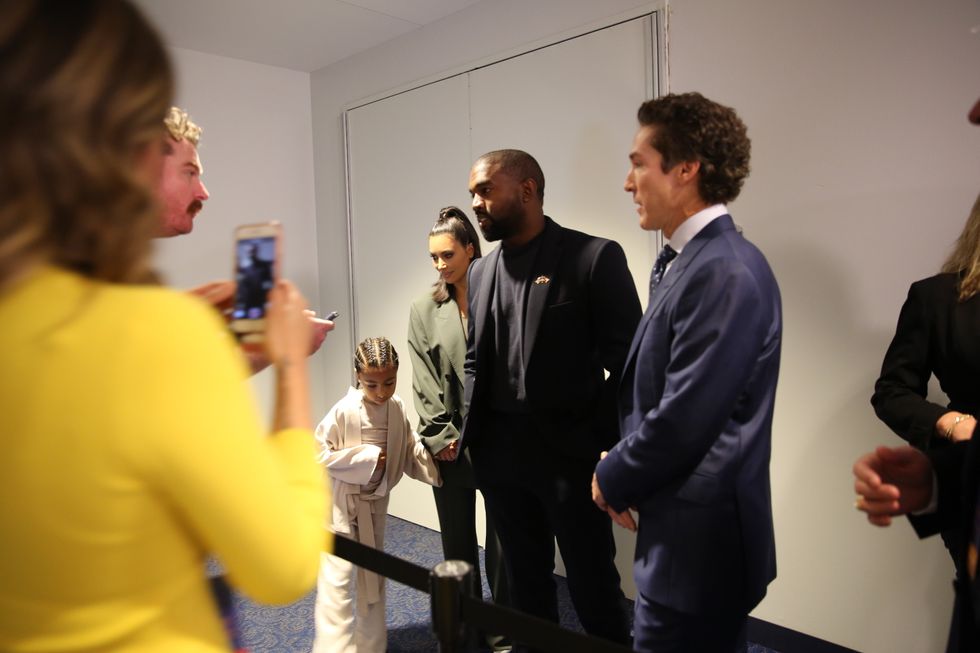
Then, he went on tour. But he never took off any time following his mother's death. And by the 2009 MTV Video Music Awards, he'd fallen to what he calls his sunken place.
He and then-girlfriend Amber Rose brought a bottle of Hennessy with them to the award show. They took slugs in the limo. Then on the red carpet.
When Taylor Swift won the award for Best Female Video, Kanye stormed the podium, sunglasses on, and grabbed the microphone, said "Imma let you finish," then let everyone know the award should've gone to Beyoncé, for "Single Ladies (Put a Ring on It)."
He was kicked out immediately. He tweeted, "Everybody wanna booooo me but I'm a fan of real pop culture... I'm not crazy y'all, I'm just real."
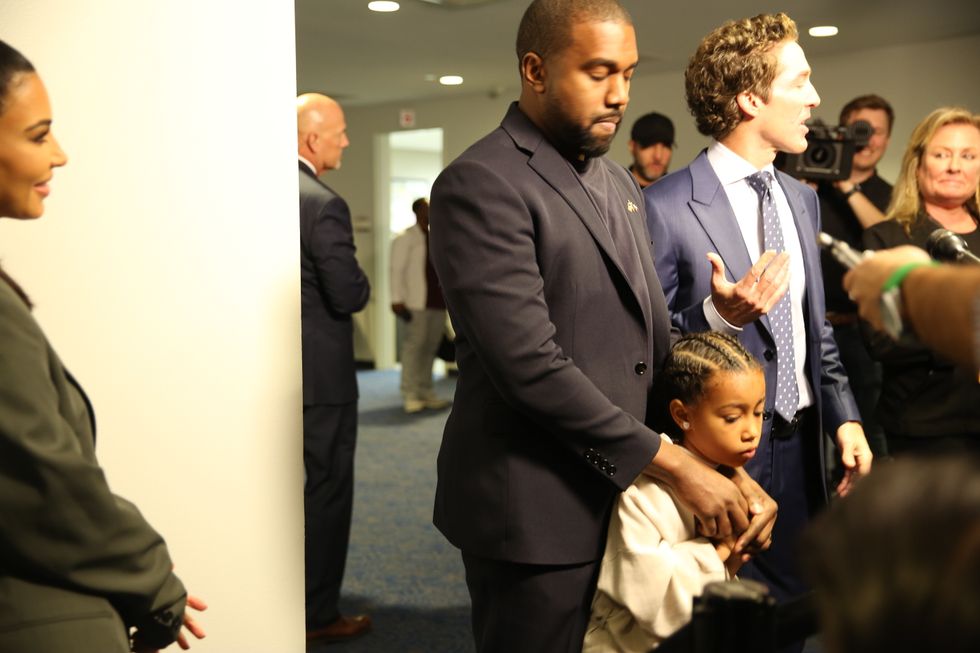
Followed by an apology. Then a few days later, during an appearance on debut episode of "The Jay Leno Show," Leno asked Kanye, "What do you think [your mom] would have said about this?"
That hit Kanye like a punch to the jaw. He teared up, froze.
He publicly apologized to Swift. Several times.
But it did little to quell the blowback. Once again, it felt like the entire nation hated Kanye. Compounded by a hot-mic recording of Barack Obama — the country's first black President — calling Kanye a jackass.
So the embattled Kanye retreated to Hawaii to record a masterpiece, 2010's "My Beautiful Dark Twisted Fantasy."
*
"We are a Christian country," Kanye said at one point, to uproarious applause.
The vast majority of Americans, 90 percent, believe in a higher power.
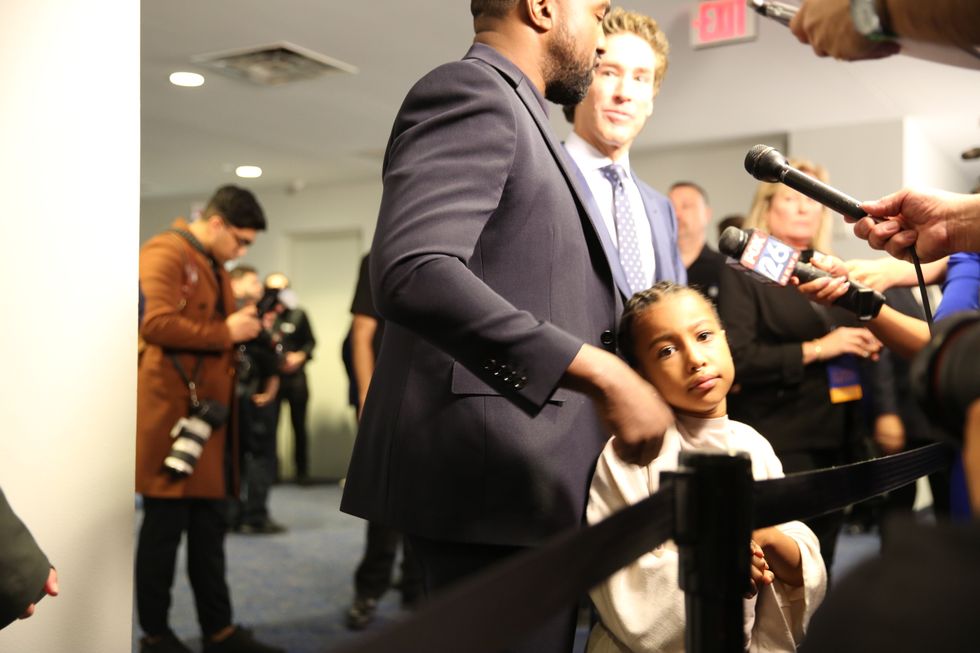
And America has the largest number of Christians in the world, with roughly 167,000,000, comprising 65-to-70 percent of the population. But that's down from 80 percent, as part of a downward trend over the last two decades.
The percent of Americans who attend a religious service of any kind — church, synagogue, or mosque — is even lower, less than half.
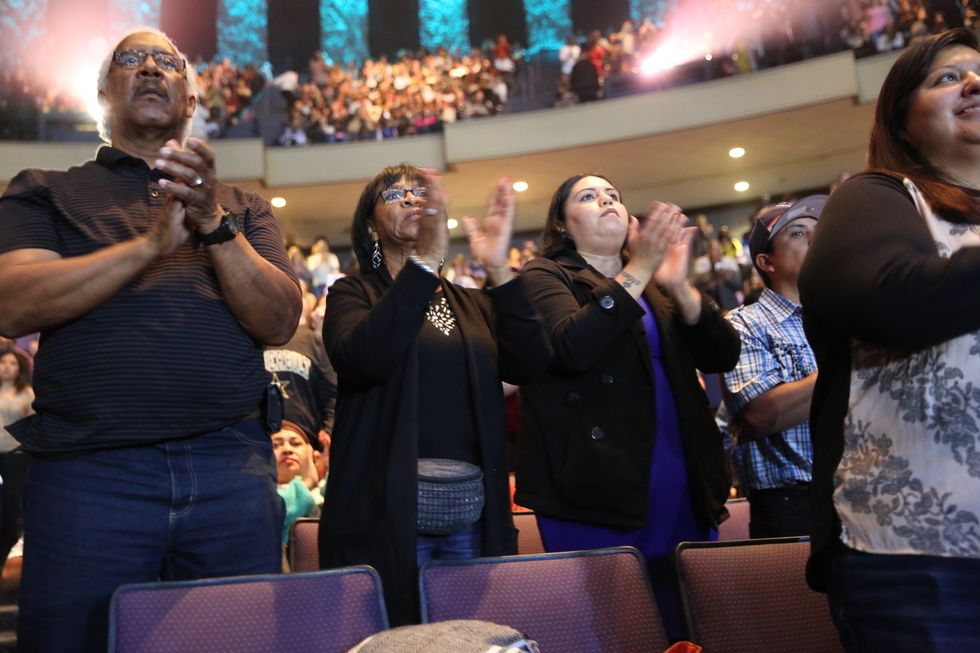
One political scientist blamed the public's growing distrust in institutions. Another blamed conservatives. A writer from New York Magazine took it a step further.
Meanwhile, conservatives have David French.
As always, the issue is far more nuanced than either side will admit.
Somehow, in the last 20 years, church and religion had become not just uncool, but slightly villainous.
All day, every time I looked around — at people singing, at people dancing, at people crying in joy or in the relief and recognition of their pain — I thought, "How could this ever be a bad thing?"
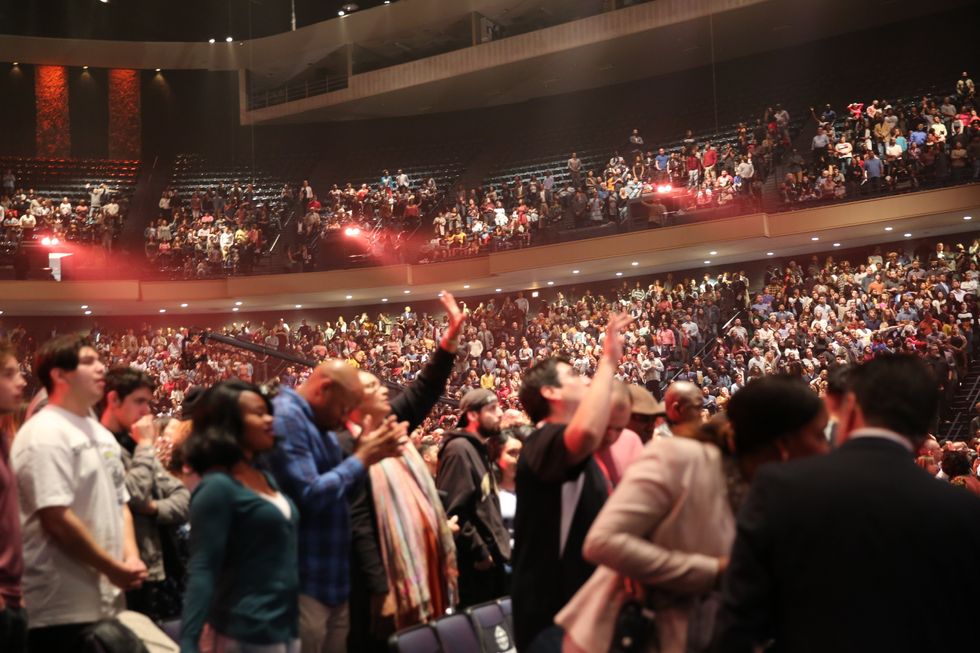
I had spent my life going to concerts, had seen Kanye West numerous times, and this was something other than a concert, and unlike anything I'd seen from Kanye. It was also more than just religious or spiritual.
A family of strangers in a city of 6 million, in a world of 7-and-a-half billion, broadcast live, led by a man who fought off the devil in front of us for years. Who struggled with life just like we do, only we could nitpick through the one-way mirrors of our phones and our TVs.
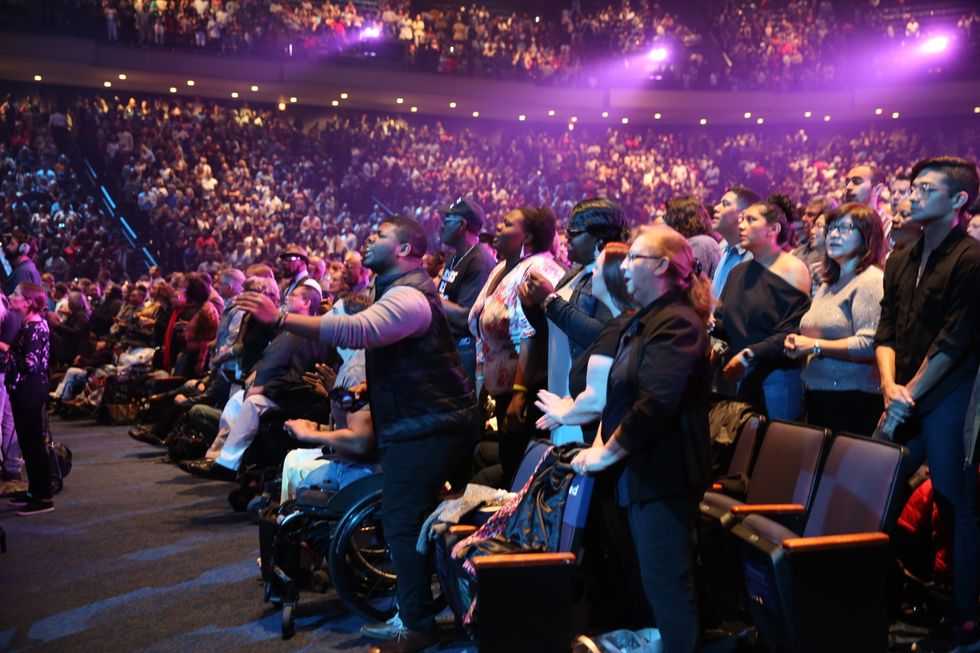
But, now, he had been baptized in public.
Some people were still negative about Kanye's recent faith, especially Christians. As Kanye raps on "Hands On":
What have you been hearin' from the Christians?
They'll be the first one to judge me
Make it feel like nobody love me
Consensus was, they couldn't believe him. As a Kanye fan since I was 13, I can tell you that he is genuine. It's really his only setting. Plus, his spiritual transformation has been building for quite some time.
*
By the time we returned to Lakewood that evening, the sky had turned dark blue and frantic with airplanes.
The sidewalks around the arena overflowed with people. Police cars jutted out in crooked lines to block entrances or exits, the strobe of red-white-blue whirling onto pedestrians' faces.
Across the street, facing the giant arena, a man with a bullhorn ranted about the evils of sinful music.
Earlier that day, sheepish protesters had occupied the spot, holding red poster-sized letters that spelled out "I-M-P-E-A-C-H."
There were only four of them, though, so they had to double up and share, and sometimes the "H" slanted down or the "I" slipped loose.
"Impeach Kanye?" one of us said, laughing.
"Kanye 2020," shouted someone.
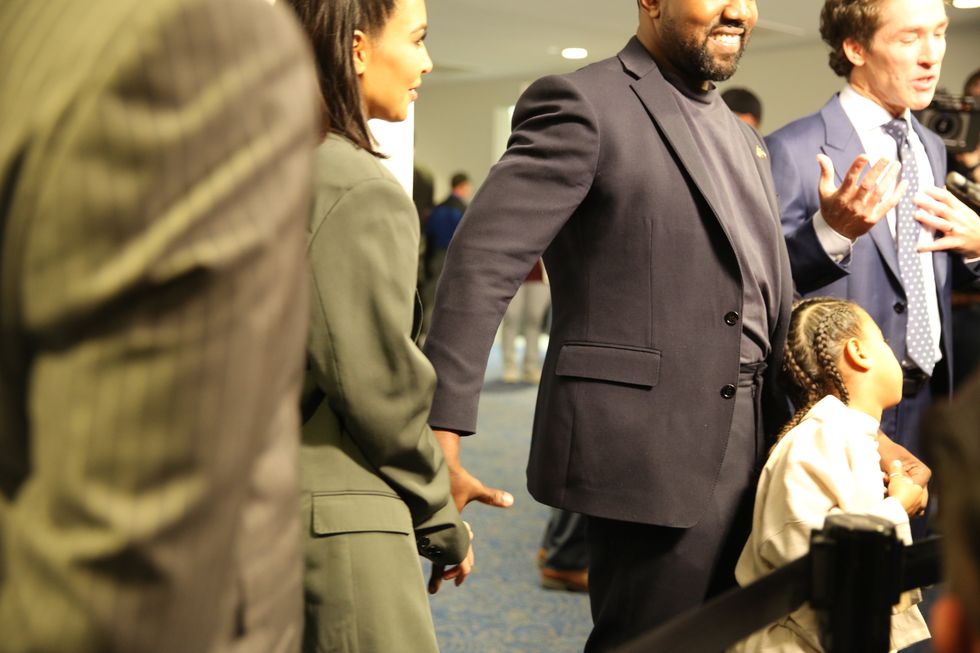
The air was electric. People bounced when they stepped, or walked faster than normal, or turned oddly as they spoke like a third-year professor.
They sang along as they passed traffic-jam cars, most of which were blasting Kanye.
A chorus of police whistles and the usual rumble of semi-trucks passing on U.S. Highway 59. Just down the street, porn shops and strip clubs and a Ferrari dealership. Immediately southwest, the Mahatma Ghandi District. West, the Galleria, home of the opulent Galleria mall, where Kanye and Kim and family had gone ice skating earlier.
Inside the arena, a different world, low-lit and glowing. A dreamscape of lambent crimsons and violets, a deeper, warmer, slower take on the lights atop the police cars outside. Globular squares of blue were arrayed along the ceiling.
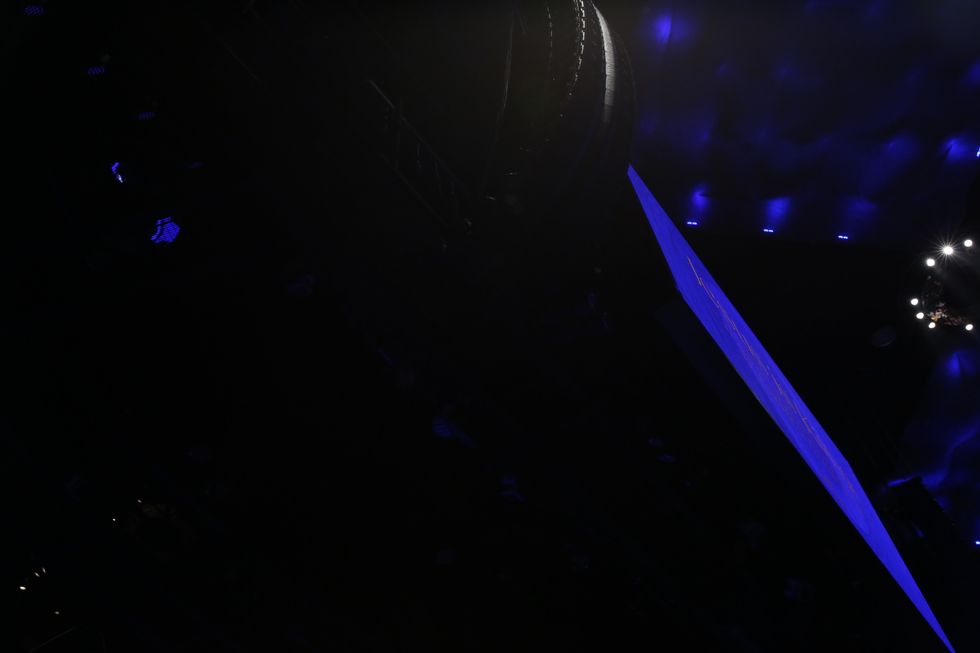
When the musicians emerged to their instruments, the arena was still half-empty. The show had already been delayed 40 minutes. The demand to get in was so ferocious that the security gate was jammed up like a glass Ketchup jar.
Then, like spirits, men and women drifted onstage in all-gray uniforms and matching hats that looked like they should say "VIETNAM VETERAN" but actually said "Sunday Service."
Every single member wore brand-new gray YEEZY Boosts.
From the start, the performance was cinematic, a sort of new world opera sung by a chorus of young American muses with nose rings or gold chains or dreadlocks or pink hair.
From the huddle, a young man rose, and began reciting a poem. It was the invocation of the muse.
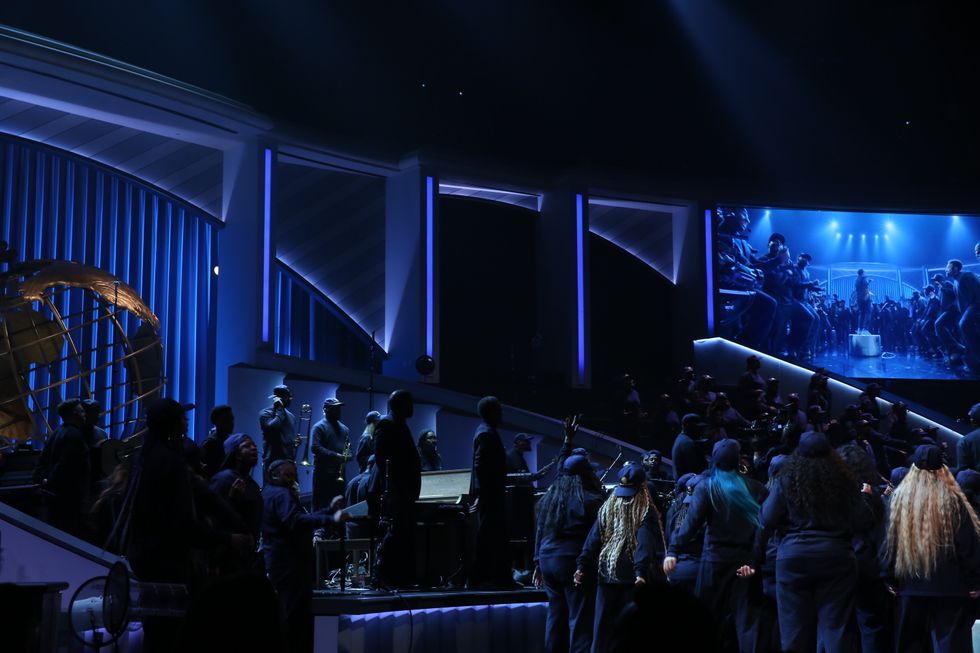
Gadamer wrote that poetry "becomes a test of what is true, in that the poem awakens a secret life in words that had seemed to be used up and worn out, and tells us of ourselves"
*
After a whirling rendition of Carl Orff's "O Fortuna," the choir began "Ultralight Beam."
They let the song spread. It grew enormous.
The air swirled as the song widened.
Kanye waited out of view, then appeared without ceremony.
A collective gasp when people recognized the melody of Stevie Wonder's "Overjoyed." Which sounds like a dream already, with all that wilderness.
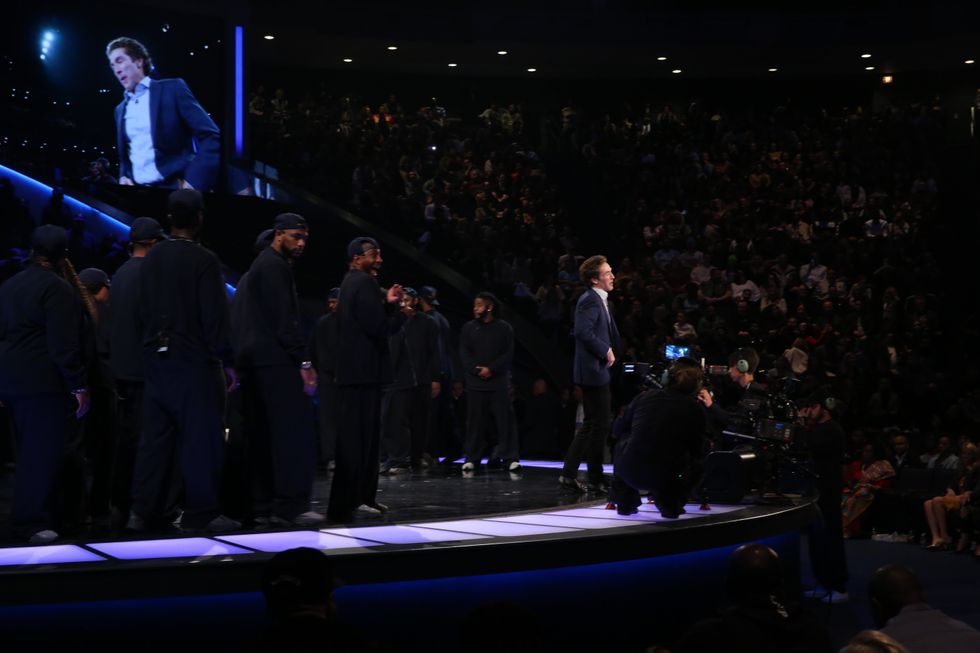
So it was even stranger when the song morphed into SWV's "Weak," a skating rink anthem written by Charlie Wilson of the GAP Band. A classic.
The choir were their own countervailing force. Yet they also connected us to the drama of the performance.
Looking back, I wish I could live in those moments forever.
*
Then came their cover of "Father Stretch My Hands" by Pastor T.L. Barrett And the Youth for Christ Choir.
Father Stretch My Handswww.youtube.com
Kanye has paid homage to Barrett's track on two different songs, from two different albums.
It was his prayer.
Pastor T.L. Barrett, a man who's lived an exciting and at times difficult life, only to become a Pentecostal preacher on Chicago's south side, and form a choir of 40 teenagers from his weekly choir practice. He went on to connect with Phil Upchurch and Rotary Connection, which featured a young Minnie Ripperton.
Barrett's album "Like a Ship (Without a Sail)" is a masterpiece.
If you dive into Barrett, you'll better understand what Kanye is doing.
*
Ten seats from Kim Kardashian West, Rep. Dan Crenshaw (Texas) stared ahead in a neat gray suit, occasionally poking at his phone and blasting people on Twitter.
Which means there were at least two people in the building who have appeared on "Saturday Night Live."
There were other politicians, including Texas Lt. Gov Dan Patrick. And even more at the earlier service. You could tell they were politicians the same way you can tell a vegan burger from a real Whopper. Several times, Kanye held up his phone up and read the words from his newer songs.
Like "Selah," which built into "Hallelujah"s at the end, intoxicating and perfect, like being sucked into an undertow. Which led into "Follow God," a continuation of "Father I Stretch My Hands."
Kanye uses the image of stretched hands to express his own submission and the process that leads to his healing. As a reference to John 21:18:
Very truly I tell you, when you were younger you dressed yourself and went where you wanted; but when you are old you will stretch out your hands, and someone else will dress you and lead you where you do not want to go.
But the song is also about Kanye's literal father, and an argument they had. Then, under it all, he adds a sample of "Can You Lose By Following God" by Whole Truth.
He ended the song with his Kanye shriek, somewhat confusing and abrasive with a choir present.
Then — something I did not expect. The thumping bass of Cajmere's "Brighter Days (Underground Goodie Mix)."
And now this was cosmic gospel.
It felt like a rave. Have you been to a rave? It's people dancing, taking MDMA. That is what it felt like.
Flourishes like that were part of Kanye's genius. No other gospel performance would dare. You won't find that kind of diversity at any other hip-hop show, either. The acoustic instruments, the choir. Maybe during a set by electronic musicians like Moodyman or DJ Koze. But, no choir. Yet here Kanye was, at Joel Osteen's church, blasting classic techno.
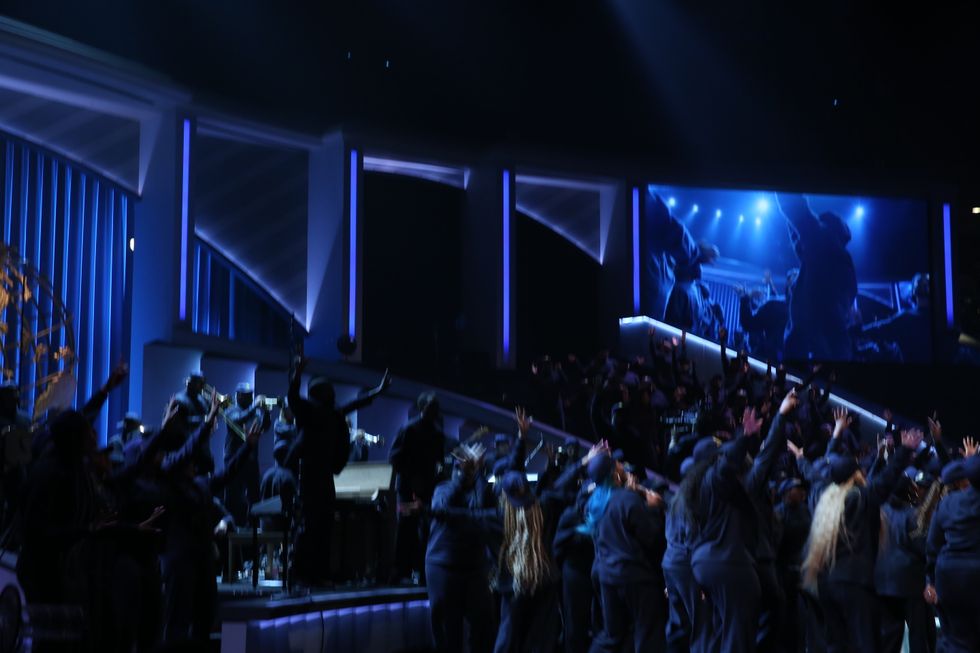
Oddly enough, though, the most popular song of the night was "Closed on Sunday," Kanye's ode to Chic-fil-A.
Everyone in the arena knew the words. So then there were two choirs, in a dialogue. I didn't think it was possible, but the collective harmony got even more intense and engulfing than it had all night. So much so that the house speakers started to peak in one corner of the arena.
The Ancient Greeks were the first to use a chorus. In the 5th century B.C., 50 actors would gather in the orchestra pit and sing in unison, commenting on the action of the play, describing scenes to the audience. They were a collective force. They represented one character, who was able to connect the audience to the characters and events onstage.
Kim Kardashian was front and center filming with her phone, as two of the West kids jumped around on the trippy blue carpet.
The performance was nearing its end, and suddenly Kanye was dressed like everybody else in the choir. Gray Yeezy kit and the Sunday Service hat. His transformation. From Kanye West to Pastor Ye, stretching hands.
Then, he was gone.
One by one, the choir began fluttering off the stage, to the Clark Sisters' "You Brought the Sunshine."
Half were gone, when I noticed the singer with braided hair crying. With every exhale, she collapsed her hands into the floor. Let them fall like tired flowers. Arrayed in fitful blue. She gasped. She heaved her shoulders like a wingspan. For a moment it was like she would actually take flight.
A security guard peered over the railing from above the stage. He looked like God. Symbolically, he was.
New installments of this series on the 2020 elections come out every Monday and Thursday. Check out my Twitter. Email me at kryan@mercurystudios.com